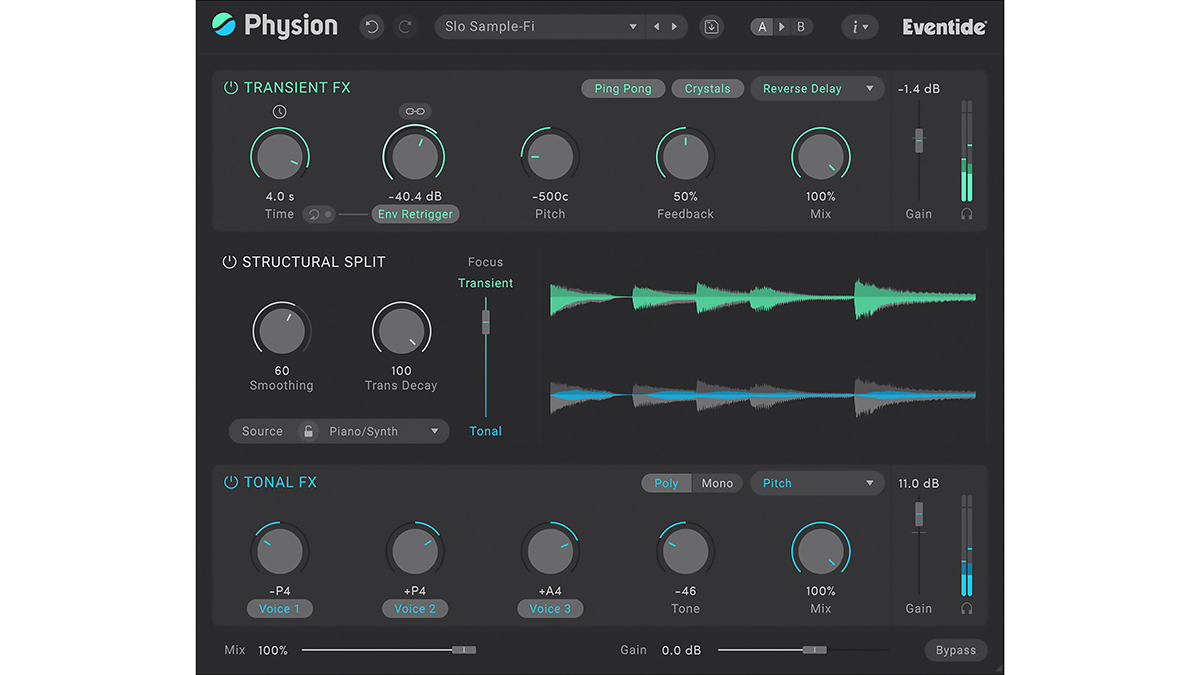Eventide’s Physion Mk II is a multi-effect with a difference, letting you process tonal and transient parts of a sound separately
The company’s refined Structural Split technology delivers the goods once again
Already a multi-effect powerhouse, Eventide’s Physion has now been revamped and reborn as Physion Mk II.
As before, Physion is powered by Eventide’s Structural Split technology - this has been improved since version 1, and is now the same as you’ll find in SplitEQ, another of Eventide’s acclaimed plugins.
Structural Split performs the highly impressive and useful trick of breaking any sound you give it into its transient and tonal parts. You can process these parts individually, leaving the plugin to automatically put them back together.
Physion Mk II offers several key improvements in comparison to its predecessor, starting with polyphonic pitchshifting. You’ll also find a new reverse delay that offers gating, ping-pong and crystal modes, along with a sidechain input for the dynamics processors. The new filters, meanwhile, come straight out of SplitEQ.
You now get a total of seven transient effects - Delay, Tap Delay, Dynamics, Phaser, Reverb, Gate + EQ and Reverse Delay. These are accompanied by eight tonal effects - Delay, Dynamics, Pitch, Chorus, Reverb, Tremolo, EQ and Reverse Delay. You also have the option to fine-tune the transient/tonal split of a sound with four Structural Split controls.
Veterans of the first version of Physion will notice that Mk II has a new, resizable GUI, complete with a scrolling waveform display and an intuitive layout. The idea is that menu diving is kept to a minimum, leaving you to enjoy the plugin’s state-of-the-art processing.

To demonstrate this, you get a huge library of more than 500 presets, all categorised so that you can find what you’re looking for, fast. The more subtle options will enable you to add colour and space or fix minor problems in a flash, but there are more transformative patches, too. Auditioning presets is made easier by the A/B comparison and Undo/Redo features, which enable you to experiment freely.
As you’ll discover if you check out the video above, Physion Mk II’s effects are truly spellbinding. You can turn a guitar part into pad with just a couple of clicks, then add even more ambient flavour by soloing the tonal channel and muting the transients.
Alternatively, how about adding a lush reverb to your vocals? Again, there’s a preset for that, but in true Structural Split style, it adds a delay to the transients and a reverb to just the tonal portion of the sound, ensuring that clarity is maintained.
These creative applications for Physion Mk II are undoubtedly inspiring, but let’s not forget that the plugin can be used correctively, too. Drums can be sharpened-up in seconds, with a transient-only gate adding instant tightness.
However you choose to use it, it immediately becomes clear that Physion Mk II is capable of delivering unique combinations of effects that other plugins would struggle to emulate, so we recommend that you check out the 30-day free demo with all due haste.
Physion Mk II is available now for PC and Mac in VST/AU/AAX formats for the introductory price of $99 (regular price $179).Find out more on the Eventide website.
Get the MusicRadar Newsletter
Want all the hottest music and gear news, reviews, deals, features and more, direct to your inbox? Sign up here.